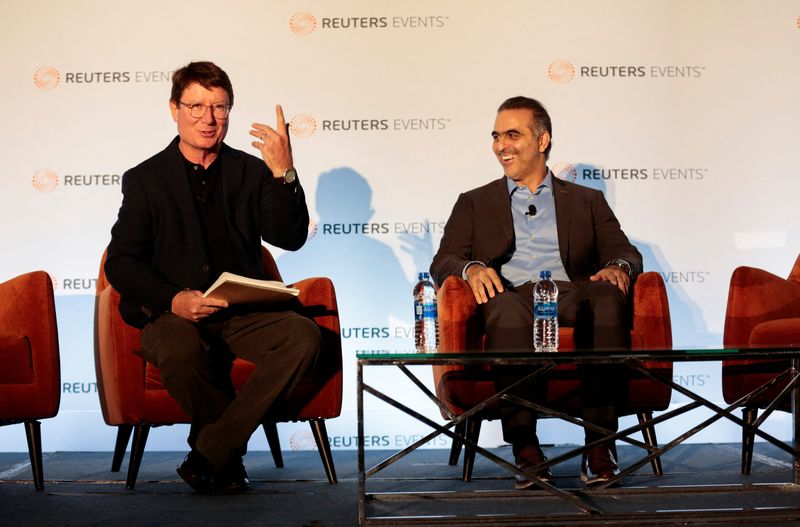By Ben Klayman
DETROIT (Reuters) -U.S. legislators need to give automakers operating in the United States more time to achieve the required sourcing levels of battery minerals used in electric vehicles to qualify for federal tax incentives, several industry executives said on Wednesday.
The Inflation Reduction Act, as currently written, requires automakers to have 50% of critical minerals used in EV batteries come from North America or U.S. allies by 2024, rising to 80% by the end of 2026. Volkswagen (ETR:VOWG_p) Americas Chief Executive Pablo Di Si said the industry cannot move that fast.
"All of us source from different parts of the world and changing these long-term contracts, you don't do that from one day to the next. We have 10, 15, 20-year commitments," Di Si said at the Reuters Events auto conference in Detroit.
U.S. lawmakers need to create a more phased-in process that goes out to 2030 instead, he and Hyundai Motor Co Chief Operating Officer Jose Munoz said at the Reuters event.
"When we saw the IRA, we were not happy," Munoz said in a separate interview, referring to the new law.
"We believe it's unfair," he added, pointing out that none of the South Korean automaker's EVs qualify for the credit.
Hyundai will break ground next week on a $5.5 billion EV plant in Georgia that will create thousands of jobs. Munoz said U.S. legislators should offer companies investing in the United States some type of waiver or a longer transition period.
Automakers are trying to figure out how their vehicles will meet the new law's requirements to qualify for EV tax credits.
Signed into law in August by U.S. President Joe Biden, the IRA contains incentives designed to help meet his administration's goals of halving U.S. carbon emissions by 2030 and getting to net-zero emissions by 2050.
Under the $430 billion law, rules governing the current $7,500 EV tax credit aimed at persuading consumers to buy the vehicles will be replaced by incentives designed to bring more battery and EV manufacturing into the United States. The domestic content requirements will ratchet up over the next six years.
New restrictions on battery sourcing and critical minerals, along with price caps and income caps, take effect on Jan. 1, which will potentially make all current EVs ineligible for the full $7,500 credit.
Details of the act are still being ironed out and the U.S. Treasury is currently taking comments on how to implement the rules around the EV tax credits.
"I don't think that you can transform the mineral production and extraction within the next two to three years," Di Si said on Wednesday in Detroit. "You cannot change the sources from Congo, China and other places within two to three years."
VW America's chief purchasing officer, Inga von Seelen, said on Tuesday at the Reuters conference that the German automaker has to source battery materials from where they are available.
VW has a supply agreement for batteries from an SK Innovation plant in the U.S. state of Georgia and in August struck a battery materials cooperation agreement with mineral-rich Canada in a move to secure access to lithium, nickel and cobalt.
AFFORDABILITY
In South Carolina on Wednesday to announce a $1.7 billion investment to build EVs in the United States, BMW CEO Oliver Zipse was also critical of the new law, telling Reuters no region can be independent especially for raw materials for EVs.
The U.S. "should have a regulation that is not completely unrealistic." He also warned the new law could inhibit investments.
At least one legislator was receptive to that argument. U.S. Senator Lindsey Graham, a South Carolina Republican, said at Wednesday's BMW event that the United States cannot make EV batteries solely from U.S. minerals and components.
On the other hand, Steve Carlisle, president of General Motors Co (NYSE:GM)'s North American operations, said the U.S. automaker should be able to meet the new law's requirements.
"We're pretty well positioned," he said at the Reuters conference, citing the Detroit automaker's four U.S. battery plants the company has announced and its raw materials supply deals. "All in, it's very beneficial to help promote (EV) adoption."
Stellantis North American Chief Operating officer Mark Stewart on Tuesday at the Reuters conference said the automaker's purchasing teams are working to meet the new law's requirements.
"We have ... very active conversations to secure capacity around the world, in the free trade zones, to make sure we're covered all the way through 2030," he said.

Stewart added it is crucial to offer vehicles that most people can afford.
"At the end of the day, if we can't make this transition to what consumers can afford, the industry's going to collapse on itself," he said. "We have to find a way to bring affordable tech into the equation."